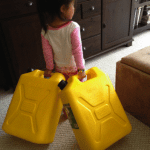Kathleen Mulhern is the Managing Editor at Patheos, and she blogs at Dry Bones. Since we recently posted an article on Spiritual Formation for Moms, I am (with permission) reposting her related reflection on “The Inadequacies of Motherhood”:
We’re wrapping up the childhood years. Long ago we moved on from play dates and zoo adventures and Baby Beluga. I didn’t have much time to mourn all that because we were soon deep into baseball games, track meets, driving lessons, and orchestral performances. But now we’ve gone to our last back-to-school night; we’ve sent them off to the last Homecoming party; we’ve had our last pumpkin-carving party; we’ve gone to the last cross country race and jazz performance; we’ve worked through the agonizing process of helping our son figure out the cleverest way to invite his date to the last Prom. It’s April, and there are five weeks of school left.
The deep sadness that comes with the waning of those golden years is mitigated somewhat by the realization that the children really need to go. They are too big. I don’t mean that physically, but emotionally and spiritually. I still want to mother them, but they’re too big for me. They have outgrown me. I still want to hold them, but my stroking will not quiet their anxieties and ambitions. I no longer have what they need to sustain their journey.
This is a hard admission. The very nature of motherhood is rooted in providing and protecting. From the first moment I held my baby to the breast, the hunger of the child and the deep joy of satisfying that hunger completely undid me. Nothing has been as gratifying as giving, sheltering, feeding, teaching, comforting, and mothering my kids.
Certainly there is still love to be given, and received. But the kind of love they will most need for the future – the love of friends, of good work, of a faithful spouse, of a nurturing community, and most of all, of their own good Lord – is not the kind of love I can provide. I was everything…for a while. The center of their universe. Now their orbit has shifted.
Dang, I loved being their center!
The mourning that I and my fellow empty-nesting mothers are feeling could easily end up becoming a wallowing in loss and a sense of pathetic abandonment. Being a mother is fairly natural – it comes over you in waves of definition through long nights and cooing smiles and wet kisses and utterly charming play. But letting go is completely unnatural – it requires you to not do what you have spent nearly two decades doing without question. It requires you to let them leave behind your self-definition in order to find their own.
But this development simply must be more than a cultural phase of life as we define it. It seems profoundly spiritual to me. An emptying and an undoing of self. A decreasing and lessening. A piercing sword, even.
I think of mother Mary, whose Son, her own dearly loved boy, outgrew her. Jesus had a Father and a calling and a power and a vision that went far beyond her careful tending. And his willing march to death, a death that she would have prevented at any cost to herself, was the final blow of rejection. Not even for his own mother would he turn from his path or his purpose. He needed more than she could give. He needed his Father’s will like he needed air.
But Mary can help us mothers go through this sense of abandonment. First, as we watch her, we should understand that they might fill us up, but we don’t fill them up. Jesus’ heart was big enough for all the world, whereas Mary (and we) only have eyes for those beautiful children of ours. Sometimes our children seem to prefer their friends’ company to ours! And so they should, for we have raised them to have big hearts, big enough for more than us.
Second, we remember Mary at the cross where Jesus cares for her future, and we recognize that these children do not stop loving us. The nature of the relationship has changed – on their part from dependence to autonomy, on ours from authoritative care-giving to compassionate caring. And if we really love them, we let them move on and we reassure them that we know they still love us. They do not need to feel shame at “abandoning” their parents. It’s important for me to tell my kids I love them AND to tell them that I know they love me.
Then we see Mary in the upper room at Pentecost, gathered with Jesus’ followers. Here we learn that to love our grown children is to gather with and love their friends. Perhaps Mary wasn’t very fond of some of them or thought they were inappropriate companions, but the love of Jesus brought them together.
Finally, our last glimpse of Mary there in the upper room – and in all of scripture – is of Mary at prayer. For all the frustrations we have had through years of parenting, surely we should welcome the quiet, empty places that bid our prayers. Now we shall see if our moaning about the lack of solitude and silence was disingenuous. Now the gift is given – the time and space to cultivate a deeper relationship with the Lord. And certainly those children will never outgrow our prayers!
And so the “abandoned” mother goes through an undoing or unwinding, a displacement as a “center,” and yet in her decreasing – a diminishment that will continue until finally all is lost – the Lord increases, until he is all in all.












